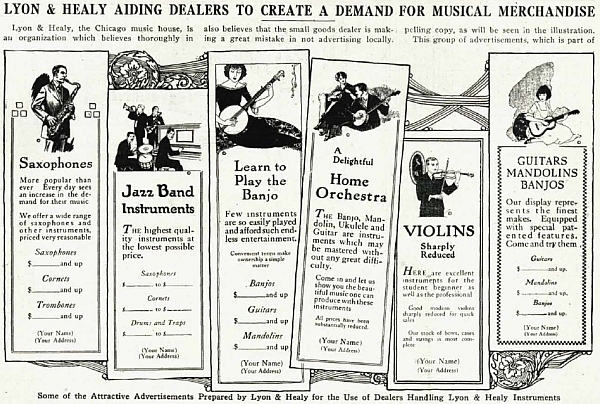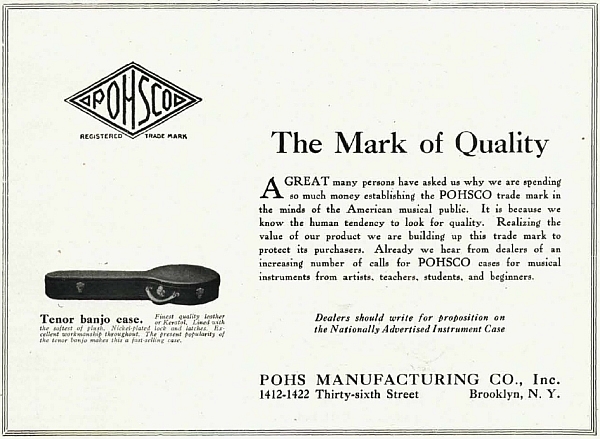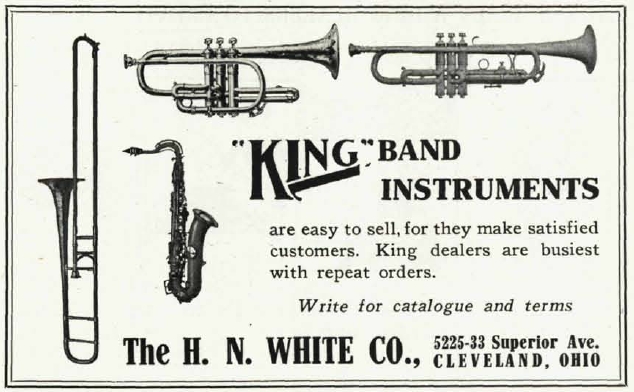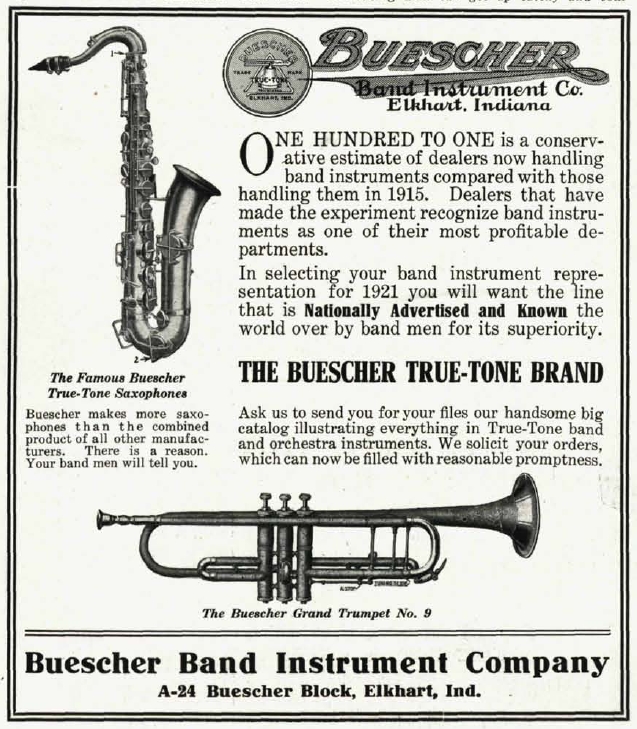| Music Trade Review |
|
Die Zeitschrift Music Trade Review ist online verfügbar: |
|
Music Trade Review - Music
Industry Magazine
Online Library: 1880 - 1933, 1940-1954 The Music Trade Review was published out of New York from 1878 until at least 1956. It apparently suspended publication with the January 1933 issue. Publication was resumed under different management sometime between 1937 and 1940. Our online library contains issues from 1880 to 1933, and from 1940 to 1954. Additional years are available for review at a number of libraries. Search www.worldcat.org for more information about the holdings of other libraries, or ask your local librarian for assistance. |
| |
| --
google Anzeige -- |
| Bitte
teilen sie diese Seite: |
|
|
OPPORTUNITIES IN SELLING INSTRUMENTSBy ZARH MYRON BICKFORDZarh Myron Bickford, the writer of this article, is universally conceded to be one of the country's foremost authorities on plectrum instruments. He has written a number of works upon the mandolin, banjo and other stringed instruments, and has appeared widely in concert work. The following article, written specially for The Review by him, expresses his views on a subject of vital importance to music dealers handling stringed instruments.—Editor's note.There are so many opportunities which loom up before the dealer when making a sale that I must hasten to explain that the opportunity I have in mind is particularly connected with the sale of stringed instruments of the fretted variety, such as the mandolin, banjo-mandolin, guitar and ukulele. Having taught these instruments for twenty-five or more years I feel qualified to state that the instruments which many pupils bring to their first lesson prove that many dealers are constantly missing an opportunity to sell a respectable and workable instrument. There is no question as to the present popularity oof these lesser members of the stringed instrument family, and while the average "legitimate" musician is apt to look with more or less disdain upon both the instruments and those who essay to play them professionally or to teach them I could name a goodly number of these "lesser members" of the musical P'-ofession whose musical knowledge and standing, as well as their earning capacity, compare more than favorably with many of the "legitimates." The particular opportunity which is open to the dealer in connection with the great popularity of these instruments is to correct the false idea which is so prevalent that any old instrument, the cheapest that can be bought, is good enough to learn on. I have repeatedly had pupils bring an instrument to their first lesson which was so cheap and badly put together and adjusted that even an expert player could not get it in proper tune and make it work, and yet the dealer had allowed it to go out of his store without even trying to show the customer that he was buying a useless article. It is hard to say just what has made this idea so prevalent, since nothing could be farther from the real truth. It is barely possible that some dealers are either ignorant of the difference between good and bad or playable and unplayalble instruments or else do not take the necessary interest to instruct their clerks in regard to this difference. For the benefit of any dealers who do not realize the seriousness of this question or who, perhaps, are themselves inclined to hold the same opinion it may not be out of place to point out some of the reasons why a cheap and badly adjusted instrument is the worst thing that could possibly be given to a beginner. Scientific FrettingFretted instruments of the mandolin and guitar variety must be accurately and scientifically fretted and have a perfect scale in order that they may be played in tune. The action must be easy enough so that the fingers are not unduly strained in pressing the strings down and so that the strings are not thrown out of tune by being pressed down. The frets must also be of the proper size and smooth enough so that the fingers are not torn to shreds by coming in contact with them. While it might be possible to have a very cheap instrument properly adjusted so that it would play fairly easy, I do not recall ever having seen such a phenomenon. All of this delicate and accurate adjusting takes time and labor to do and cannot be expected in an instrument which is ground out like sausage in a machine. The nut and bridge must be at the proper height and the neck and fingerboard perfectly straight, so that the beginner is able to get a clear tone from the very start, and so that his fingers will not bf worn out at the first attempt. Even if it were possible to put one of these cheap, nondescript instruments in playing condition the tone is usually enough to discourage anybody without a very strong constitution from going further with a musical education. The beginner, who is handicapped in a hundred ways, needs a better instrument than an experienced player, and even a good carpenter cannot do good work with poor tools. The dealer's opportunity lies in showing the difference between the cheap and unreliable instrument and one which is made by a reputable maker who is proud to have his name on his goods, and in showing the customer not only that a cheap instrument is not good to learn on, but is absolutely detrimental to the beginner's ear, disposition and future musical progress. An Opportunity for Greater ProfitThe secondary opportunity (I call it secondary because real service and satisfaction to the customer should be put first) is the correspondingly greater profit resulting from the sale of a better instrument and also the satisfaction of feeling that there will be no come-back. Those who object to buying a fairly good instrument at the outset for fear it will be ruined the first day should be shown that a well-made instrument is many times stronger and more durable than the cheap contraptions which are merely thrown together. There is also the frequent excuse on the part of parents that they dlo not care to invest much in an instrument until they find out whether Harry or Lucy can learn to play. While this argument has a grain of reason in it the dealer's opportunity and even his duty lies in showing this customer that the best way to find out whether the child can learn to play is to give him an instrument which is at least "workable" instead of one which even an expert player could not use. Many dealers refuse to carry instruments which they know will prove unsatisfactory and if more would adopt this plan the makers of cheap and useless instruments would have to go out of business or else turn out reliable goods. Unfortunately, however, there seem to be a greater number who are content to sell anything that is asked for, without even trying to show the customer that money put into a cheap who hurt their own standing and discourage and disgust a customer who might prove to be a very valuable patron. It is, of course, true that the percentage of profit is usually greater on the worthless instruments, but that dealer is blind indeed who allows this to influence him in such a case. The question of just how cheap an instrument may be and still be playable or good enough to be recommended to a pupil is hardly within the province of this little article to answer and, in fact, is dependent on circumstances to a certain extent. Minimum Prices on Quality GoodsOne prominent house in New York City refuses to recommend anything under $15, this applying to all fretted instruments alike, but I would be inclined to put the minimum a little higher than that. Many dealers feel compelled to carry a line of very cheap instruments, but they are used merely for emergency sales and are never displayed. On the other hand, I have not infrequently heard dealers or their clerks tell customers that instruments were from $5.00 (or even less) "up." This, from the point of salesmanship psychology alone, is the wrong end to work from, since it might even influence the customer to take the cheap instrument when he had really intended to spend a little more. The Need of a TeacherStill another opportunity which the small goods dealer has is that of correcting the fallacy that one can learn the mandolin, ukulele, etc., without the assistance of a teacher. It is perfectly true that these instruments are comparatively easy to learn; that is to say, one may become fairly proficient in a much shorter time than is necessary with the piano or violin. But there is a right and a wrong method of playing and the novice who buys an instrument with the assurance of the dealer that no lessons will be needed usually comes to grief in a few days and gives up his anticipated musical career, or perhaps comes back to the dealer for advice in live selection of a teacher. It is to be feared that many dealers hope to make the sale of the instrument more sure if they convince the customer that he can go home and press a magic button, and, lo! he will suddenly become a musician. It is, of course, true that there are good and bad teachers, but this is where the dealer must use his discrimination and see that only the up-to-date and perfectly competent and reliable teachers are on his list. Selling a Teaching MethodThe final opportunity is that of selling and recommending a thorough and practical method lor the instrument which is being sold or studied. The majority of dealers are well aware that the usual so-called "'self-instructor" is almost worse than useless as a means of learning to play an instrument. In the first place, it is merely a collection of tunes, many of them not even adapted to the instrument, with a few scales or diagrams thrown in, the same series usually being printed for all instruments, including trombone and fife. Dealers should acquaint themselves with the latest publications of the leading publishers and should carry in stock such methods as are written by practical teachers and authorities on the particular instruments under question. The Dealer's PartThe writer is intensely interested in the future of the fretted instruments and earnestly hopes that dealers will assist in the general uplift which may be brought about, or at least hastened by the embracing of the opportunities above mentioned. |
|
Quelle / source: http://mtr.arcade-museum.com/MTR-1921-72-14/30/ |
Lyon & Healy aiding Dealers to Create a Demand for Musical Merchandise |
Pohs Manufacturing Company |
King Band Instruments |
The Beuscher True-Tone Brand |
>>> Zurück zum Inhalt - Back to the Contents <<< |
| Wenn
sie diese Seite
ohne Navigationsleiste angezeigt bekommen, dann klicken sie hier um die MandoIsland Homepage zu öffen: |
 |